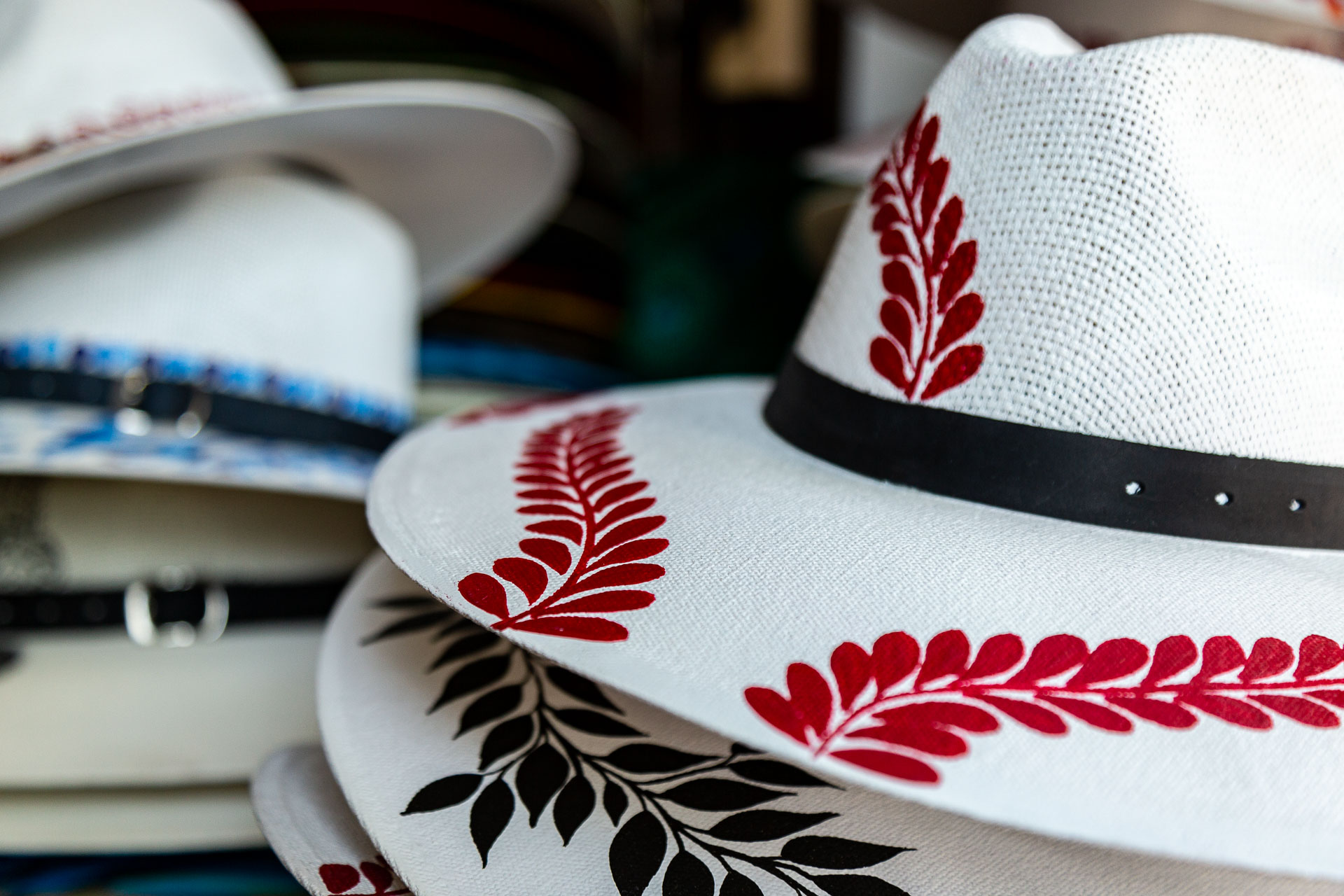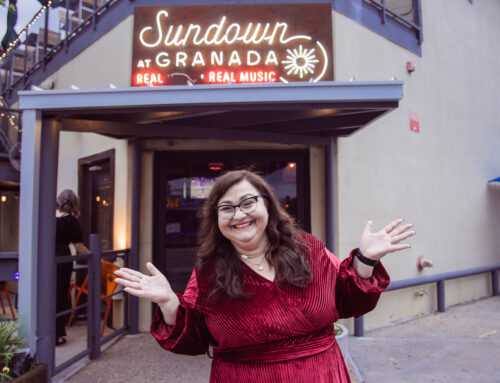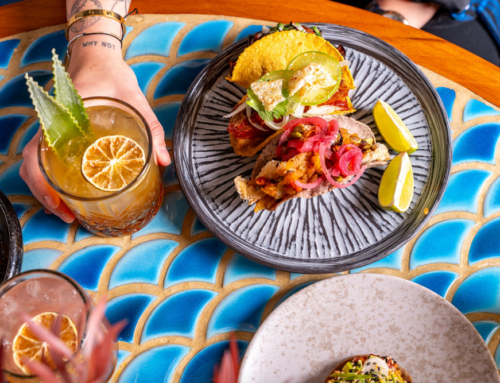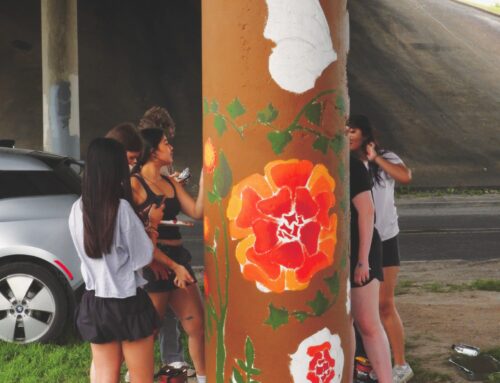
Artesanías Zahra Darwish. Photography by Yuvie Styles.
Editor’s note (Nov. 29): A previous version of this story incorrectly identified the specifics of Zahra Darwish’s trip to Mexico. It was Darwish and a friend. Her children were not with them.
Zahra Darwish saw the signs: The pandemic was coming, and lockdowns were happening.
She had a choice. Either she could stay at home in East Dallas, or she could go to Mexico.
Even though Darwish had deep roots in our neighborhood — it’s where she reared her children, who attended Woodrow Wilson High School, and where her father owned a sandwich shop called Zak’s for over 20 years — she didn’t hesitate to move south.
Her trip began in Mexico City. As regulations related to the pandemic tightened, Darwish and a friend moved into more remote areas of the country. They stayed at a nearly deserted resort in Cuernavaca. Next, they intended to travel to a lake town, Valle de Bravo, west of Mexico City.
But they never made it there because they stopped in Taxco de Alarcón in the state of Guerrero and never left. About 6,000 feet above sea level, with temperatures ranging from 60 degrees to 90 degrees year-round, the town is known for its silver production.
Darwish saw there how the pandemic was decimating the livelihood of indigenous peoples, who typically make their money by selling handcrafted goods to tourists.
“I was concerned,” she says. “I have, I guess, this drive to be a voice for people who don’t have a voice.”
That voice was also used to advocate for her daughter, Hanaa, who has autism. Darwish earned her bachelor’s degree in Middle Eastern studies at the University of California, Los Angeles, but she decided to return to school in 2011 to get a degree in speech language pathology and audiology so she could become a licensed therapist and more effectively help her daughter.
Before Darwish stepped in, Dallas ISD was bussing Hanaa to Harold Wendell Lang Sr. Middle School, near Buckner Boulevard and Interstate 30. Hanaa was locked in a classroom because fights broke out at school, Darwish says, and she couldn’t eat lunch in the cafeteria, either.
Eventually, with constant pushing by Darwish, Dallas ISD allowed Hanaa to attend J.L. Long Middle School, where she was enrolled in the deaf education program for a year. But Darwish identified unused funding that began a special education program at the school. Throughout the rest of her daughters’ time in the district, Darwish worked on education initiatives, advocating for families of students with special needs.
When the pandemic closed schools, Darwish’s role changed. She arrived in Mexico, saw the plight of the indigenous populations and thought about how she could help. She remembered a now-closed store on Henderson Avenue called Mariposa, which sold textiles, art and jewelry from Mexico.
Inspired by Mariposa, Darwish decided to start her own business, Artesanías Zahra Darwish, with the goal of supporting a few Mexican artists and teaching Americans about native Mexican art and cultures.
She worked with artists to develop silver jewelry and hats, and then she added masks. Darwish has since narrowed product offerings down to hats, though she has a whole drawer of masks in her showroom.
Hats and other items for sale at Artesanías Zahra Darwish. Photography by Jessica Turner and Yuvie Styles.
It’s typical for artisans in the village of San Agustín near Taxco to sell hand-painted ceramics and hats.
“Those are cute, but it’s like any souvenir shop. It’s not high quality,” Darwish says. “If you lose it, it’s no big deal. It’s just a few dollars.”
Wanting to make more elaborate hats, Darwish employed artisans to paint them with designs inspired by Mexican art styles, such as Talavera and Tenango.
Some of the hats are embroidered, not painted. The woman who stitches them took the earnings from her work for Darwish to get a divorce and escape a dangerous domestic situation.
“We’re not a big organization, but it feels good to be able to see the difference that we’re making in peoples’ lives,” Darwish says.
Artisans across Mexico are involved in the making of one hat. Milliners are located in Guanajuato, the leathersmiths in Colima, the silversmiths in Taxco and the painters in San Agustín.
Darwish provides creative direction but allows the painters to express themselves in each piece. She also lets the artisans determine the price.
“I let them understand, we’re going to sell your piece for this much, but I need you to think about what you feel is respected for your art,” Darwish says. “And it’s always three, four times more than the hats they’re selling on the street.”
It can take anywhere from four to 50 hours to craft a single hat. The more time-consuming projects are the Huichol hats, which require artists to layer paint so it actually feels like beadwork in the end. Those cost about $350 each.
Darwish rents a space in Taxco where artists can paint. While they’re there, she provides them with food and any supplies they need and helps with child care. She also covers their medical expenses and teaches them business skills.
Edgar is one of the painters. His wife, Mari, used to accompany him when he painted, sometimes helping with touch-ups. But Darwish saw Mari’s talent and asked her to paint by herself.
“I have her signing her own name,” Darwish says. “And now she’s making decisions because she makes money in the family.”
Darwish keeps around 400 hats at a time in her East Dallas studio. Designs include geometric patterns, village scenes, plants and animals, and college mascots with a whimsical spin.
Because she travels so often, Darwish invites customers to shop even when she’s not there. She can unlock the building remotely and has wine in the refrigerator. When shoppers find what they want, they just send Darwish a picture so she knows how much to charge them.
Most sales come from online or at events and shows, but Darwish says she hopes to partner with a brick-and-mortar store to sell hats there. She also started a new project called Miracle Hearts for Autism. They carve wooden hearts at their workshop in Mexico, and Hanaa’s nurses work with her to paint a base coat on them. Then, Hanaa helps select colors and milagritos, little miracles, to nail to the hearts. On the back, they add a fact about autism.
“To provide for her now and for the 30 years that she’s going to be alive once I’m dead, that’s really the hardest part of this. And that’s why I work so hard to make change,” Darwish says. “And hopefully the good juju that I’m putting out in the world is going to rain down on her with society and people and kindness, showing her grace.”








